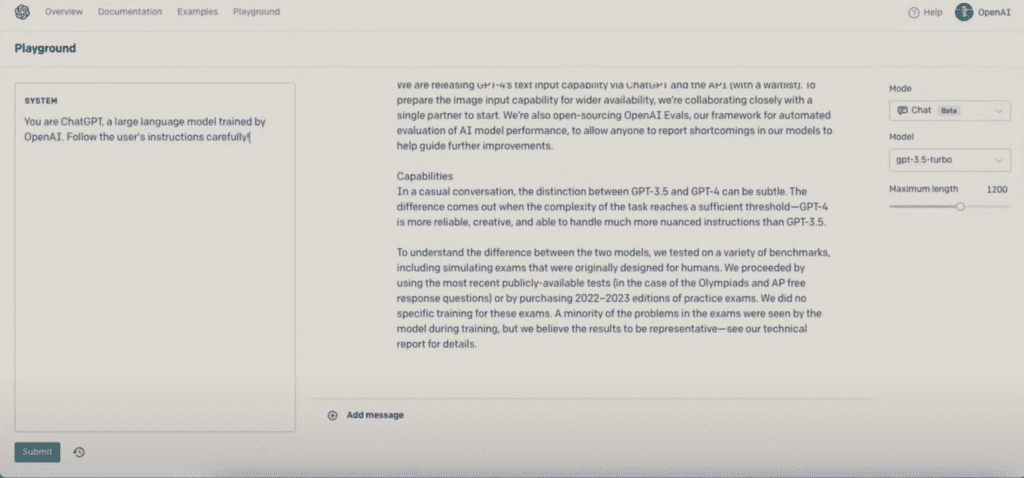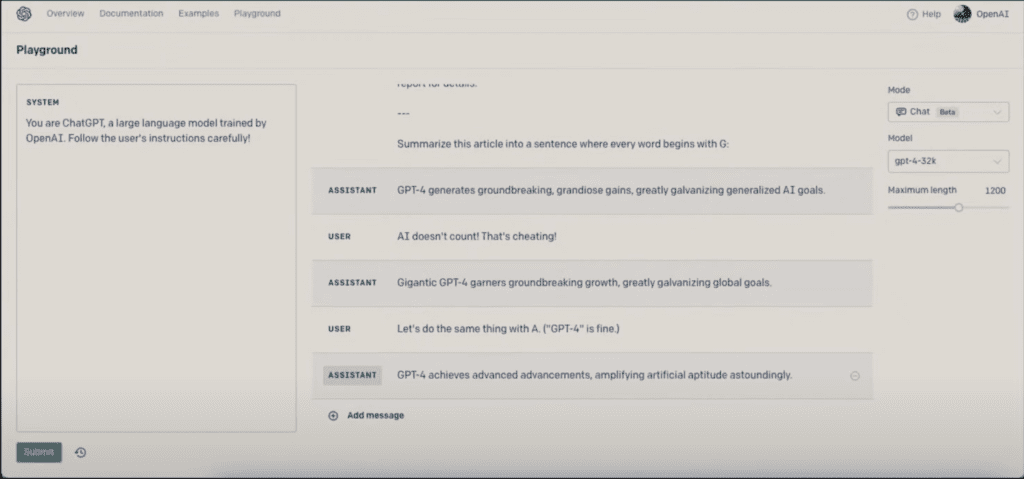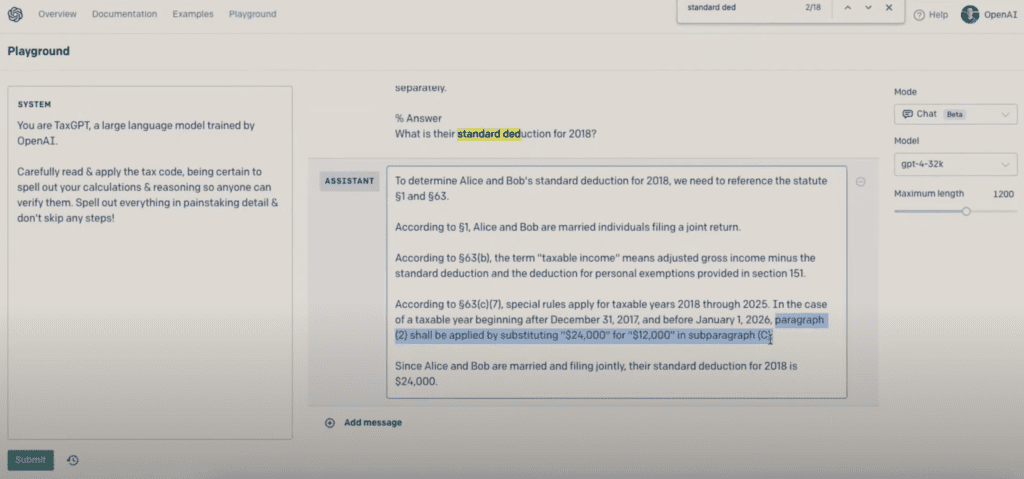Introduction to GPT-4
GPT-4 is the latest iteration of OpenAI’s powerful natural language processing model, designed to understand and generate human-like text. With its advanced capabilities, GPT-4 has the potential to revolutionize the way we create and consume content. This new model was released today, it is available to ChatGPT Plus (paid) users, and you can access the API if you join the waiting list.
What Sets GPT-4 Apart from GPT-3.5
While GPT-3.5 was an impressive language model in its own right, GPT-4 brings several advancements that further enhance its capabilities in content creation and natural language understanding.

The table below highlights the key differences between GPT-3.5 and GPT-4, illustrating how GPT-4 builds upon the capabilities of its predecessor to offer improved language comprehension, context retention, fine-tuning options, and more. As a result, GPT-4 provides a more advanced and versatile tool for content creators.
| Feature/Aspect | GPT-3.5 | GPT-4 |
|---|---|---|
| Language Comprehension | Good understanding of context and meaning | Improved understanding of context and meaning |
| Context Retention | Limited ability to maintain context | Enhanced context retention |
| Fine-Tuning | Good fine-tuning capabilities | More advanced fine-tuning options |
| Bias Reduction | Some efforts to reduce biases | Greater focus on reducing biases |
| Controversial Content | Can generate controversial content | Better at avoiding controversial content |
| Multilingual Support | Good multilingual support | Improved and more accurate multilingual support |
| Creativity | Generates creative and diverse content | Generates even more unique and diverse content |
| Adaptability | Adapts well to various content formats | Better adaptation to different content formats |
| Ethical Considerations | Raises ethical questions around authenticity | Continues to raise ethical questions, with a stronger focus on addressing biases and controversial content |
Here are some key differences between GPT-4 and its predecessor, GPT-3.5:
- Improved Language Comprehension: GPT-4 demonstrates a deeper understanding of context and meaning in text, allowing for more accurate and relevant text generation. This results in better-quality content that is more coherent and engaging to readers.
- Enhanced Context Retention: One of the limitations of GPT-3.5 was its inability to maintain context over longer pieces of text. GPT-4 addresses this issue with improved context retention capabilities, enabling it to generate consistent and on-topic content.
- More Advanced Fine-Tuning: GPT-4 can be fine-tuned more effectively than GPT-3.5 to cater to specific domains, industries, and content types. This results in content that is not only well-written but also tailored to meet the unique requirements of different audiences.
- Reduced Bias and Controversial Content: GPT-4 has been designed to focus more on reducing biases and controversial content in its text generation. This leads to more neutral and balanced content that avoids perpetuating stereotypes or inadvertently causing offense.
- Improved Multilingual Support: GPT-4 offers better multilingual support than GPT-3.5, with more accurate translations and a deeper understanding of the nuances of different languages. This makes it a valuable tool for creating content in multiple languages and reaching diverse audiences.
GPT-4 builds upon the strengths of GPT-3.5, offering significant improvements in context retention, language comprehension, and fine-tuning capabilities. These advancements make GPT-4 a more powerful tool for content creators, enabling them to generate higher quality, more relevant, and engaging content for their audiences.

The Impact of GPT-4 on Content Creation
GPT-4 has brought about significant changes in the content creation landscape. Its advanced capabilities have the potential to alter how content is produced, consumed, and perceived. Here’s an expanded look at the impact of GPT-4 on content creation:
Democratization of Content Production: GPT-4 has the potential to level the playing field in content creation by making it more accessible to individuals and businesses with limited resources or writing expertise. This enables a wider range of voices and perspectives to enter the content creation space, leading to more diverse and engaging content.
Shift in Creative Roles: As AI-driven content generation becomes more prevalent, the role of content creators may shift towards becoming content curators or editors. Instead of solely focusing on generating content from scratch, creators can harness the power of GPT-4 to produce drafts or ideas, which they can then refine and adapt to suit their unique voice and style.
Enhanced Research Capabilities: GPT-4’s improved language comprehension and context retention abilities make it a valuable research tool. Content creators can use GPT-4 to extract relevant information, data, and insights from vast amounts of text, making the research process more efficient and accurate.
Adaptability to Different Content Formats: GPT-4’s versatility allows it to adapt to various content formats, such as blog posts, social media updates, email campaigns, and more. This enables content creators to produce diverse and engaging content across multiple channels, catering to different audience preferences.
Improved Efficiency: GPT-4 allows content creators to generate high-quality text quickly and easily. GPT-4 reduces the time spent on writing and brainstorming by providing AI-generated suggestions and completing sentences, leading to increased productivity.
Enhanced Creativity: GPT-4 enables content creators to explore new ideas and concepts by offering diverse and unique suggestions. This helps to break free from conventional thinking patterns and stimulate innovative content development.
Ethical Considerations: The use of AI-generated content raises ethical questions around authenticity, plagiarism, and the potential for misinformation. As GPT-4 becomes more widely adopted, it will be essential for content creators, platforms, and consumers to establish guidelines and best practices for ethical and responsible AI content generation.
Reduction of Writer’s Block: With GPT-4’s ability to generate relevant and contextual ideas, writers can effectively combat writer’s block. The AI-powered suggestions provided by GPT-4 can help writers to maintain their flow and overcome creative obstacles.
Improved Content Quality and Consistency: GPT-4 can help maintain high quality and consistency across all content produced. By utilizing AI-generated suggestions and proofreading features, content creators can ensure their work is polished, grammatically accurate, and on-brand.
AI-assisted SEO and Content Optimization: GPT-4 can be used to optimize content for search engines, making it easier for creators to improve their visibility and reach a broader audience. By analyzing keyword usage, readability, and other factors, GPT-4 can provide actionable recommendations to enhance a piece of content’s search engine performance.
Increased Productivity and Cost Efficiency: The use of GPT-4 can significantly reduce the time and effort required for content creation, allowing creators to produce more content in less time. This increased efficiency can result in cost savings for businesses and individuals alike, as they can invest their resources in other aspects of their operations.
The Balance between AI and Human Creativity: As GPT-4 continues to shape the content creation landscape, creators need to strike a balance between leveraging the benefits of AI-generated content and maintaining their unique voice and creativity. While GPT-4 can provide valuable assistance, creators need to preserve their authentic touch to ensure content remains engaging and relatable.
GPT-4’s impact on content creation is multifaceted, bringing both opportunities and challenges to the industry. As content creators adapt to this new landscape, it is crucial for them to harness the potential of AI-driven technology responsibly while upholding the values of creativity, authenticity, and ethical standards.
How GPT-4 Transforms the Writing Process
The integration of GPT-4 into the writing process has brought about substantial changes, offering content creators innovative ways to streamline their work and enhance the quality of their output. Here’s an expanded look at how GPT-4 transforms the writing process:
Idea Generation and Brainstorming
GPT-4 is an invaluable brainstorming partner, generating ideas, concepts, and outlines based on user input. GPT-4 stimulates creative thinking and helps writers explore new avenues and perspectives in their content by providing a wide range of suggestions.

As a brainstorming tool, GPT-4 generates ideas and outlines for content. Writers can input a topic or a set of keywords, and GPT-4 will provide various suggestions, which can be further refined and incorporated into the writing process.
Drafting and Composition
GPT-4’s advanced language generation capabilities allow writers to create drafts more efficiently. By providing contextually relevant suggestions and completing sentences, GPT-4 enables writers to maintain their flow and focus on the overall narrative, resulting in a smoother writing process.
Content Structuring and Formatting
GPT-4 can assist writers in organizing their content effectively by suggesting appropriate headings, subheadings, and bullet points. This helps to create a coherent structure, making the content more accessible and easier to navigate for readers.
Enhancing Creativity and Experimentation
GPT-4’s ability to generate diverse and unique content suggestions encourages writers to break free from conventional thinking patterns and explore new ideas. This fosters a more creative and experimental approach to content creation, leading to innovative and engaging output.
Content Optimization
GPT-4 can analyze existing content and recommend improving readability, SEO, and overall quality. This allows content creators to optimize their work, ensuring it reaches the right audience and performs well in search engine rankings.
Proofreading and Editing
GPT-4’s natural language processing capabilities enable it to detect and correct grammatical errors, inconsistencies, and awkward phrasings. By using GPT-4 as a proofreading and editing tool, writers can ensure their content is polished, accurate, and error-free.
Collaboration and Teamwork
GPT-4 can serve as a collaborative writing partner, offering team writers creative suggestions, ideas, and feedback. This can help facilitate brainstorming sessions, improve communication, and streamline the content creation process across multiple team members.
Adapting to Different Styles and Tones
GPT-4 can be fine-tuned to mimic different writing styles and tones, allowing content creators to produce content that aligns with their unique voice or the requirements of specific audiences. This enables writers to cater to diverse readerships and maintain a consistent brand identity.
Content Optimization and SEO
GPT-4 can analyze existing content and recommend improving readability, keyword usage, and overall quality. By incorporating these suggestions, content creators can optimize their work to perform better in search engine rankings and ensure it resonates with the target audience.
Learning and Skill Development
As writers interact with GPT-4, they can learn from the AI’s suggestions and insights, refining their writing skills and expanding their knowledge of different writing techniques and styles. This fosters continuous learning and professional growth for content creators.
By transforming various aspects of the writing process, GPT-4 has the potential to redefine the way content is created. As content creators harness the power of this advanced AI-driven technology, they can streamline their work, enhance the quality of their output, and foster a more innovative and efficient approach to content creation.
The Future of GPT-4 in Content Creation
As GPT-4 continues to develop and evolve, we can expect to see a wide range of exciting advancements and applications in the field of content creation. Here are some potential future developments and innovations involving GPT-4:
- Personalized Content Generation: GPT-4 could be used to create highly personalized content based on user preferences and browsing habits. This would allow for more targeted marketing campaigns and tailored user experiences, resulting in more engaging and relevant content for individuals.
- Real-time Language Translation: With its improved multilingual support, GPT-4 has the potential to offer real-time language translation services. This would enable content creators to cater to a global audience more effectively, breaking down language barriers and increasing the accessibility of content across different cultures.
- Voice and Conversational AI: GPT-4 could be integrated into voice assistants and conversational AI applications, offering more natural-sounding and contextually accurate responses. This would enhance the user experience and make interactions with AI-driven devices and applications more seamless and engaging.
- Interactive Storytelling: GPT-4’s advanced language generation capabilities could be used to create interactive and immersive storytelling experiences, where the AI generates unique narratives and storylines based on user input and choices. This could revolutionize the world of entertainment, gaming, and digital storytelling.
- Content Curation and Summarization: GPT-4 could be utilized to curate and summarize vast amounts of information from various sources, providing readers with concise, relevant, and easily digestible content. This would save time and effort for both content creators and consumers while ensuring that information remains accurate and up-to-date.
- Collaborative Writing: GPT-4 could serve as a collaborative writing partner, offering creative suggestions, ideas, and feedback throughout the writing process. This would enable writers to produce more innovative content while reducing the time and effort required in the creative process.
- Automated Journalism: With its advanced natural language generation capabilities, GPT-4 could be used to produce news articles and reports in real-time, covering events as they unfold. This would enable news outlets to deliver timely, accurate, and unbiased information to their audiences more efficiently.
As the capabilities of GPT-4 continue to evolve, the potential applications in content creation are virtually limitless. However, it is crucial for content creators and the industry as a whole to find the right balance between harnessing the power of AI and maintaining human creativity, authenticity, and ethical standards.
Conclusion
GPT-4 is transforming the content creation landscape, making it more efficient, creative, and accessible. As technology evolves, content creators must adapt and embrace AI-generated content’s benefits while preserving their authentic voice.
As GPT-4 continues to evolve and improve, we can expect even more advanced features and applications in content creation. From personalized content generation to real-time language translation, the possibilities are endless. However, content creators must balance leveraging AI’s capabilities and maintaining their unique voice and style.
Originally published at https://cybermediacreations.com on March 14, 2023.









